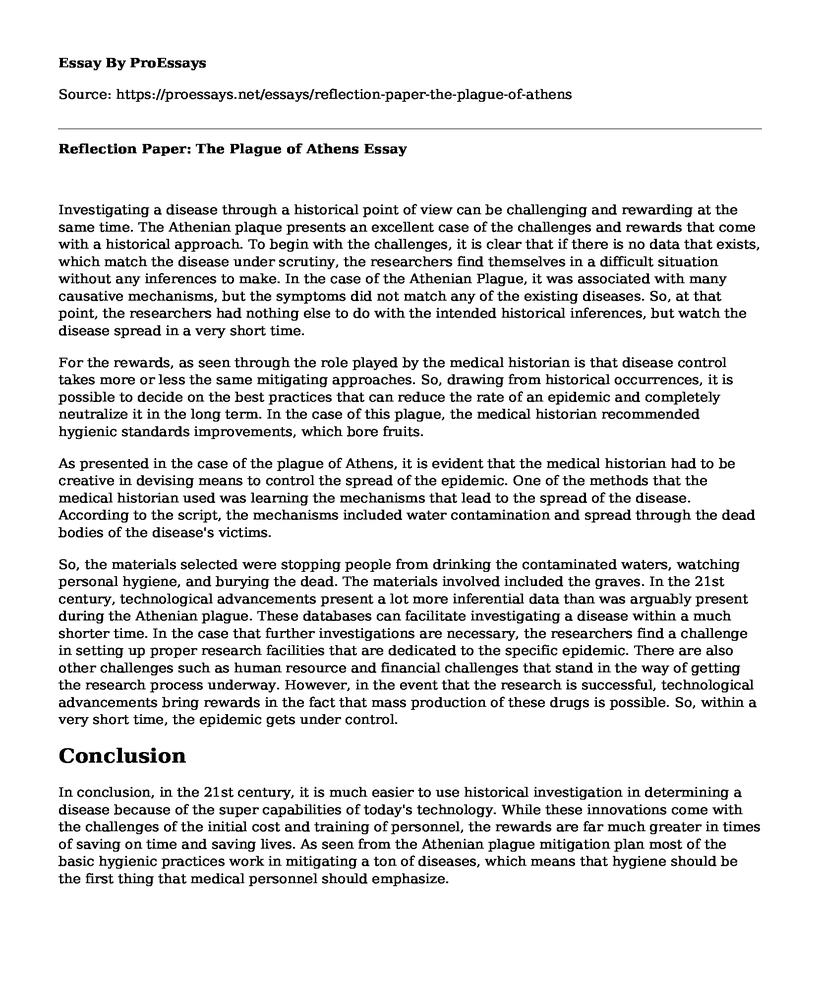Investigating a disease through a historical point of view can be challenging and rewarding at the same time. The Athenian plaque presents an excellent case of the challenges and rewards that come with a historical approach. To begin with the challenges, it is clear that if there is no data that exists, which match the disease under scrutiny, the researchers find themselves in a difficult situation without any inferences to make. In the case of the Athenian Plague, it was associated with many causative mechanisms, but the symptoms did not match any of the existing diseases. So, at that point, the researchers had nothing else to do with the intended historical inferences, but watch the disease spread in a very short time.
For the rewards, as seen through the role played by the medical historian is that disease control takes more or less the same mitigating approaches. So, drawing from historical occurrences, it is possible to decide on the best practices that can reduce the rate of an epidemic and completely neutralize it in the long term. In the case of this plague, the medical historian recommended hygienic standards improvements, which bore fruits.
As presented in the case of the plague of Athens, it is evident that the medical historian had to be creative in devising means to control the spread of the epidemic. One of the methods that the medical historian used was learning the mechanisms that lead to the spread of the disease. According to the script, the mechanisms included water contamination and spread through the dead bodies of the disease's victims.
So, the materials selected were stopping people from drinking the contaminated waters, watching personal hygiene, and burying the dead. The materials involved included the graves. In the 21st century, technological advancements present a lot more inferential data than was arguably present during the Athenian plague. These databases can facilitate investigating a disease within a much shorter time. In the case that further investigations are necessary, the researchers find a challenge in setting up proper research facilities that are dedicated to the specific epidemic. There are also other challenges such as human resource and financial challenges that stand in the way of getting the research process underway. However, in the event that the research is successful, technological advancements bring rewards in the fact that mass production of these drugs is possible. So, within a very short time, the epidemic gets under control.
Conclusion
In conclusion, in the 21st century, it is much easier to use historical investigation in determining a disease because of the super capabilities of today's technology. While these innovations come with the challenges of the initial cost and training of personnel, the rewards are far much greater in times of saving on time and saving lives. As seen from the Athenian plague mitigation plan most of the basic hygienic practices work in mitigating a ton of diseases, which means that hygiene should be the first thing that medical personnel should emphasize.
Cite this page
Reflection Paper: The Plague of Athens. (2022, Jul 15). Retrieved from https://proessays.net/essays/reflection-paper-the-plague-of-athens
If you are the original author of this essay and no longer wish to have it published on the ProEssays website, please click below to request its removal:
- Definitions and Issue of Incivility in Nursing - Research Paper
- Evaluation Essay on Lions Gate Hospital: Coastal Care & Trauma Services
- Registered Nurses: Global Leaders in Health Care, Policymaking, and Nursing Care - Essay Sample
- Essay on Beloved: Examining the Destructive Legacy of Slavery
- Essay Example on Privatizing Child Welfare: Exploring CBC for Foster Children in Florida
- Free Report Sample on Arlington Free Clinic: Bridging the Gap in Healthcare Since 1994
- Annotated Bibliography Example on Footwear Choices for Older People: Minimizing Fall Risk







